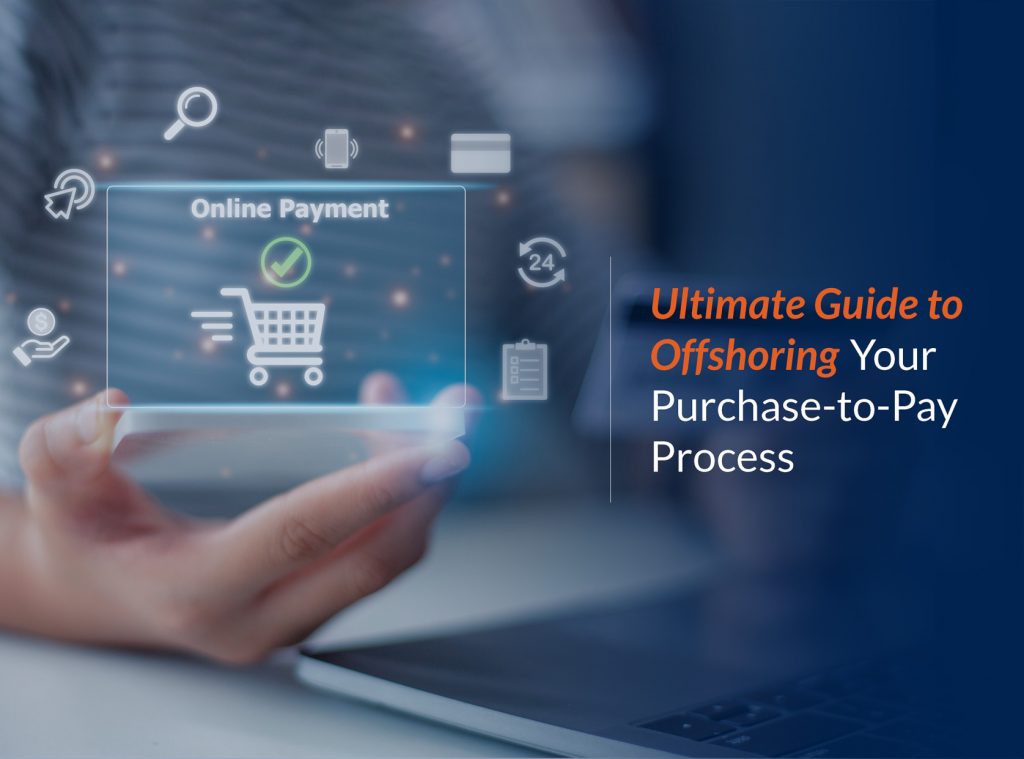In the dynamic realm of business, mastering the Procure-to-Pay (P2P) process is vital for operational efficiency and financial agility. In this blog, we delve into the strategic trend of offshoring P2P function, a move that promises cost savings, access to global expertise, and scalable operations.
Read on to learn about the complexities of offshoring your P2P processes with insights on maximizing benefits while mitigating challenges, ensuring your P2P process is not just maintained, but optimized for success!
Why Offshore Your P2P Process?
When considering offshoring your Procure-to-Pay (P2P) process, you’re making a strategic decision that can yield various benefits for your business. Here’s why you should consider taking this route:
- Cost Savings and Efficiency: By offshore outsourcing your P2P process, you can significantly reduce operational costs. Outsourcing to countries with lower labor costs allows you to maintain efficiency while cutting down on expenses.
- Access to Global Talent and Expertise: Offshoring provides you with access to a diverse pool of skilled professionals worldwide. This diversity brings in a wealth of expertise, allowing you to tap into specialized knowledge that may not be readily available locally.
- Enhanced Scalability and Flexibility: Offshoring allows your business to scale up or down more easily in response to changing needs. With a team operating in a different time zone, you can achieve round-the-clock productivity and adapt your workforce size as required.
- Focus on Core Business Functions: By outsourcing your P2P process, you free up internal resources and time to concentrate on your core business functions. This strategic reallocation allows your team to focus on activities that directly contribute to your business’s growth and success.
In summary, offshore outsourcing your Procure-to-Pay process can be a key driver for cost efficiency, global talent access, scalability, and refocusing efforts on what truly matters for the core of your business.
Choosing the Right Offshore Partner
Selecting the appropriate offshore partner for your Procure-to-Pay (P2P) process is a crucial step in ensuring a successful outsourcing endeavor. Here’s a breakdown of the key considerations to guide you in making the right choice:
- Criteria for Selecting an Offshore Provider: Before finalizing an offshore partner, establish clear criteria that align with your business goals. Consider factors such as the provider’s reputation, industry experience, client testimonials, and financial stability. A comprehensive due diligence process ensures a solid foundation for a successful partnership.
- Evaluating Expertise in P2P: Assess the offshore provider’s expertise specifically in the Procure-to-Pay domain. Look for a track record of successful P2P outsourcing projects, the depth of their knowledge in procurement processes, and their ability to adapt to evolving industry standards. A provider with specialized P2P experience is better equipped to meet your unique requirements.
- Importance of Technology and Security: Ensure that your potential offshore partner employs state-of-the-art technology and robust security measures. A technologically advanced partner can enhance the efficiency of your P2P process, while a strong emphasis on security protects your sensitive data. Inquire about their cybersecurity protocols, data encryption practices, and compliance with industry regulations.
- Cultural Alignment and Communication: Assess cultural compatibility to foster effective collaboration. A shared understanding of work culture, values, and communication styles is essential for seamless cooperation. Effective communication is particularly vital in offshore partnerships. Ensure that your chosen partner has a proactive approach to communication, employs proficient English speakers, and facilitates transparent reporting and feedback mechanisms.
In summary, the success of offshoring your P2P process hinges on selecting the right partner. Thoroughly evaluate potential providers based on criteria, P2P expertise, technology and security measures, as well as cultural alignment and communication practices to establish a partnership that aligns seamlessly with your business objectives.
Best Practices for Offshoring P2P
To maximize the benefits of offshoring your Procure-to-Pay process, it’s essential to adhere to best practices that contribute to a seamless and effective outsourcing experience. Consider the following key practices:
- Establishing Clear Communication Channels: Communication is the linchpin of successful offshoring. Implement robust communication channels that facilitate regular updates, feedback, and discussions. Utilize video conferences, collaboration tools, and project management platforms to bridge the geographical gap and ensure everyone is on the same page.
- Ensuring Quality Control and Compliance: Prioritize quality control mechanisms to maintain the integrity of your P2P processes. Clearly define performance metrics and key performance indicators (KPIs) that align with your business objectives. Regularly audit and assess the quality of work to ensure compliance with industry standards and internal policies.
- Transitioning Processes Smoothly: Plan and execute a well-thought-out transition process. Develop a comprehensive transition plan that includes a phased approach to onboarding offshore teams. Provide adequate training and resources to facilitate a smooth handover of responsibilities. Minimize disruptions by carefully managing the transition period.
- Training and Development for Offshore Teams: Invest in training and development programs for your offshore teams. Equip them with the necessary skills and knowledge to excel in their roles. Continuous learning opportunities contribute to the growth and adaptability of offshore teams, enhancing their overall effectiveness in managing P2P processes.
By adhering to these best practices, you can build a robust foundation for a successful offshoring experience. Clear communication, quality control, smooth transition processes, and ongoing training are integral components that contribute to the efficiency and effectiveness of your offshore Procure-to-Pay operations.
Overcoming Challenges in Offshoring P2P
While offshoring your Procure-to-Pay process brings numerous advantages, it’s crucial to address and overcome potential challenges to ensure a smooth and successful operation. Here are key strategies for overcoming common challenges:
- Managing Cultural Differences: Acknowledge and embrace cultural diversity within your offshore teams. Foster open communication to understand and appreciate different work styles and perspectives. Implement cultural sensitivity training to bridge gaps and promote a collaborative and inclusive work environment.
- Handling Time Zone Differences: Time zone disparities can impact communication and project timelines. Mitigate this challenge by establishing overlapping work hours for effective real-time communication. Clearly define expectations regarding response times and leverage project management tools that facilitate asynchronous collaboration, ensuring progress continues seamlessly.
- Ensuring Data Security and Privacy: Prioritize robust data security measures to protect sensitive information. Clearly outline security protocols and standards, ensuring that your offshore partner complies with industry regulations. Implement encryption, secure file-sharing systems, and regular security audits to minimize the risk of data breaches and safeguard your P2P processes.
- Navigating Regulatory Compliance: Stay informed about the regulatory landscape in both your home country and the offshore location. Ensure that your offshore partner adheres to international and local regulations governing data protection, privacy, and business practices. Regularly update compliance protocols and conduct thorough assessments to mitigate legal risks.
By proactively addressing these challenges, you can enhance the resilience of your offshoring strategy. Effectively managing cultural differences, handling time zone disparities, ensuring robust data security, and navigating regulatory compliance are essential steps in overcoming obstacles and ensuring the success of your offshore Procure-to-Pay processes.
How can StratShore help?
StratShore handles all aspects of accounts payable, from processing invoices to managing vendor queries and data. With our experienced offshoring services, you can outsource your procure-to-pay process, automating and streamlining finance tasks. Drive excellence with StratShore’s efficient solutions for procurement and payment processes.
Conclusion
In conclusion, offshoring your Procure-to-Pay (P2P) process offers compelling benefits: cost savings, global talent access, scalability, and a focus on core functions. To make offshoring successful, you must choose the right partner, prioritize communication, quality control, and training, and address challenges like cultural differences and data security.
Embrace offshoring not just as a cost-cutting measure but as a strategic imperative for growth and efficiency in a dynamic business world. With careful planning and continuous improvement, businesses can gain a competitive edge and achieve sustainable success in P2P processes through offshoring!




